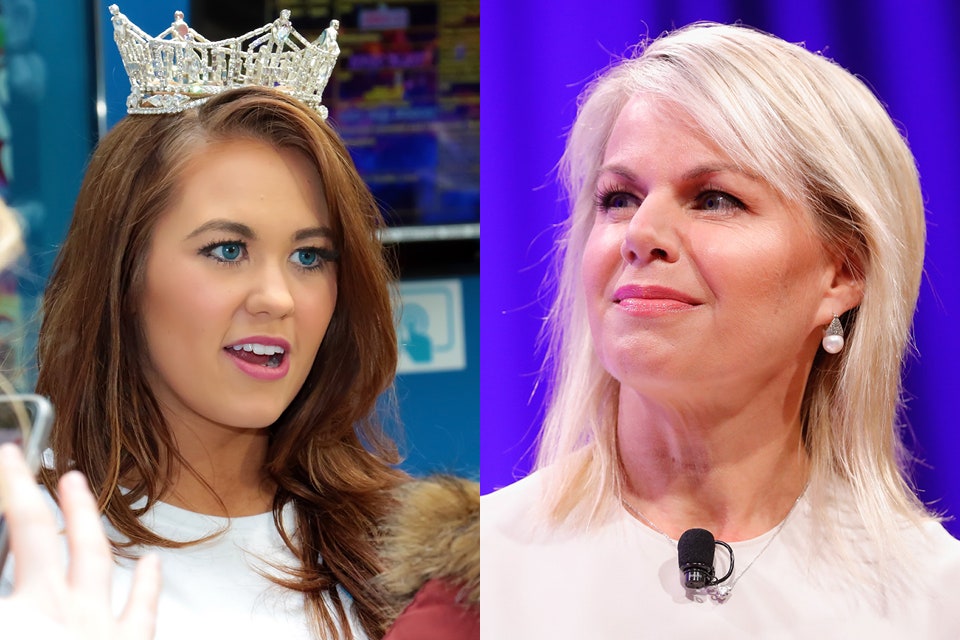The Miss America pageant drama didn’t end with the abolishment of the swimsuit competition earlier this year. After a tumultuous few months, during which the old leadership was purged—in 2017, former CEO Sam Haskell and other executives were ousted after emails surfaced in which he laughed at the suggestion by a show writer of referring to past Miss America winners as “cunts” and body-shamed 2013 winner Mallory Hagan as “huge” and “gross”—Gretchen Carlson, former Fox News anchor, was installed as board chair, along with all-new female leadership. (In June, they announced that they had even done away with the “pageant” label: Instead, it’s now a “competition.”) But it seems like the new regime has been beset by its own problems: The reigning winner, Cara Mund, has said that Carlson and Miss America CEO Regina Hopper—yes, that’s Regina and Gretchen, as in Mean Girls—“systematically silenced me, reduced me, marginalized me, and essentially erased me in my role as Miss America in subtle and not-so-subtle ways on a daily basis” once she donned the crown. And now, Carlson has fired back.
Mund was Miss North Dakota, and her pageant platform included encouraging more women to run for political office, a goal in line with Miss America’s supposed modernization under Carlson, whose role seamlessly integrated into her post–Fox News evolution as an advocate for women in the workplace, building on her notoriety she gained when suing former Fox News chairman Roger Ailes for sexual harassment. She has connected the measures to reform Miss America (including doing away with the swim competition) to the #MeToo movement.
Cut to last week, when Mund sent a letter to former Miss Americas accusing Carlson and Hopper of doing the opposite of empowering her in her Miss America role: “Let me be blunt,” Mund wrote. “I strongly believe that my voice is not heard nor wanted by our current leadership; nor do they have any interest in knowing who I am and how my experiences relate to positioning the organization for the future . . . After a while, the patterns have clearly emerged, and the sheer accumulation of the disrespect, passive-aggressive behavior, belittlement, and outright exclusion has taken a serious toll.”
Mund claims that, from the get-go, she felt ostracized in favor of Carlson as the face of the organization, despite her winning title. This includes being left out of meetings and interviews and called by the wrong name, she wrote. She was excluded from the televised announcement of the elimination of the swimsuit competition and said that her outfit choices were “ridiculed” by handlers. “When she reached out to former Miss Americas to see if they had been treated similarly,” according to the Associated Press, Mund said she “was reprimanded by Regina who told me that problems and concerns had to be kept ‘in the family.’ ”
In her letter, Mund claims that much of the strife between herself and Miss America leadership was due to the prominent role of Carlson as a spokesperson: “Right away, the new leadership delivered an important message: There will be only one Miss America at a time, and she isn’t me,” Mund said. She said that she was given “talking points” that boosted Carlson’s credibility as a female role model, including “Miss America is relevant. The #MeToo movement started with a Miss America, Gretchen Carlson. Gretchen Carlson went to Stanford.” In response to Mund’s grievances, pageant officials from at least 19 states have called for the current leadership to resign, according to the AP.
Then it was Carlson’s turn: In her own response on Twitter, she wrote in a statement to Mund that “I have never bullied or silenced you. In fact, I have acknowledged to you and your parents many times that the organization understands the frustrations of serving during such a change-filled and stressful year. It surely was not what you had expected. We’ve acknowledged your grievances, and taken many steps to try to make your experience a good one.”
X content
This content can also be viewed on the site it originates from.
She also blamed Mund’s letter for a loss of scholarship funding: “Friday, as an organization, we learned that $75,000 in scholarships, which would have been the first scholarship increase in years, is no longer on the table as a direct result of the explosive allegations in your letter,” Carlson claimed. Her statement included a kind of women-have-to-build-other-women-up chastisement with which we’ve become familiar in press releases: “The impact won’t stop there—we are already seeing a negative ripple effect across the entire organization, and I am so concerned that it will dilute the experience for the next woman selected to wear the crown.”
For its part, the Miss America Organization has said that it “supports Cara. It is disappointing that she chose to air her grievances publicly, not privately. Her letter contains mischaracterizations and many unfounded accusations.” Given the continued tumult, it begs the question we’ve been asking for a while: Does America have any need for beauty pageants at all?
Read More Culture Stories:
- Melania Trump Meets Vladimir Putin in Helsinki in Strange Video—Read More
- How Pope Francis Is Changing the Catholic Church—Read More
- Serena Williams’s Husband, Alexis Ohanian, Makes All the Other Husbands Look Bad—Read More
- Lindsay Lohan’s New Reality TV Show: Is She Our Next Lisa Vanderpump?—Read More
- Phone Addiction? Here’s One Way to Fix It—Read More
